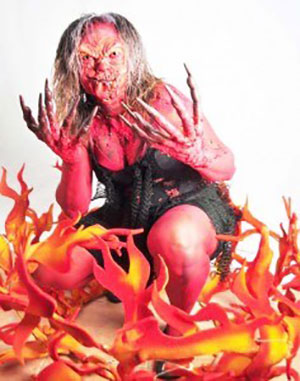I MUST admit that growing up, I was never really exposed to a fully “traditional Guyanese lifestyle.” Though my family’s roots are in Linden and Bartica, I grew up as a “town girl.” My paternal grandmother who lived with us for a few years before migrating would tell me stories from time to time, but my memory fails me as to the details and I don’t recall many of them being about Guyanese folklore.

I believe that Guyanese folklore is a staple of the Guyanese experience, and while I became familiar with many of the stories by word of mouth over time, I can’t say that I truly knew the details of all the mystical, magical creatures that make up these tales.
And so it was that when I recently decided to enter the 2020 Guyana Annual Short Story Competition, it was because I was attracted by this year’s theme of Guyanese folklore. I wanted to be able to immerse myself in the knowledge of these stories, find out their origins and the meanings behind these tales. I knew that this experience would leave me feeling more connected to my Guyanese culture.
I welcomed the initiative by the Guyana Annual to promote local folklore among our culture. There is a seeming gap in the transmission of these stories to our younger generation. Added to the limited written sources that have immortalised these stories and the dwindling elderly population who still remember telling them, we risk widening this gap until these stories are totally forgotten if we do not continue to come up with ways of continuing these customs.
So my entry into the competition was not to win, but instead to better acquaint myself with these stories and to be part of the continued contribution to our culture. Mind you, my own research was quite limited in the information I could access, but I enjoyed being able to come up with my version of one of these local tales and I look forward to seeing what other creations will come from this challenge as well.
I do believe that beyond such initiatives, as well as the individual attempts to write folklore stories, we should do much more as a people to promote Guyanese culture through its folklore and mythology. In 1946, Venezuela established the Institute of Folklore connected to its Ministry of Education for the chief purpose of expressing Venezuelan culture for posterity. In other countries such as Panama, Eastern Europe and Russia, there are similar culture groups formed that promote folk art, dance, music, stories and other aspects of folk culture all year round. These groups host events packed with the sounds, costumes and literature of century-old stories that highlight the country’s roots.
We have our Guyana Folk Festival which is hosted by our diaspora in the U.S. and the UK, but there is so much we can do right here at home to keep our Guyanese-ness alive. But while we await institutional intervention, I do believe that it can all begin with artists.
We must harness the knowledge of our elders to gather and record as many iterations of these stories as possible. We must jot them down, write stories, draw pictures, write songs, make costumes- whatever is required to ensure that this is brought up in our generation. We can mix modern aspects of our real world into these stories to appeal to our younger generation and encourage them to take an interest in later passing them on as well.
Folklore is a rich, but dying medium through which beliefs, norms and experiences of our ancestors are transmitted over the generations and often form the basis for a country’s culture. Why, then, should we allow modernity to overshadow these practices in the name of forging into the future? There is a saying that goes: “In order to know your future, you must understand your past.” I believe there is much truth in this adage.
Guyanese of today are struggling with the identity of who we really are, while continuously being caught up in the influences of Western culture that infiltrate our minds through the internet and television. While nothing is wrong with these indulgences, we must ensure that we know where WE started. It is those intricacies that ground us, that mould us; that help us to stand up in confidence with a sense of who we are. Without those foundations, I am afraid that we will forever be like loose leaves in the wind.
So start writing. Start drawing. Start singing more of our stories; more of our history; lest we lose them, and lose ourselves forever.
Interested in contributing to this column on writing? Email me at thewritemind592@gmail.com



.jpg)











